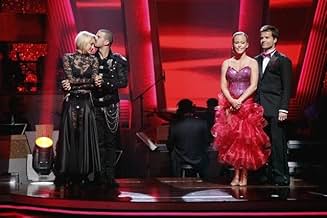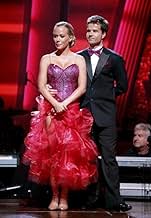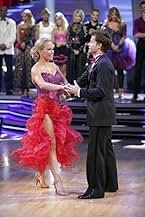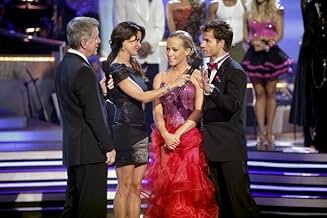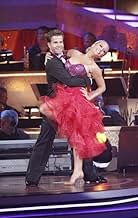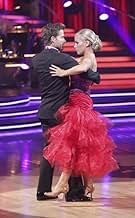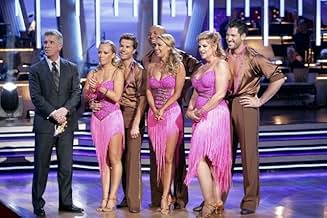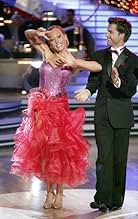Louis van Amstel
- Additional Crew
- Actor
Louis van Amstel is a professional dancer, Latin American style. Van
Amstel was born in The Netherlands. In 2000, he retired from competing,
but he regularly appears in exhibition performances. Van Amstel lives
in New York City, and has produced dance shows on Broadway at City
Center (Latin Fusion) and in Salt Lake City (Latin Revolution). Van
Amstel directed, choreographed and performed in Latin Fusion through
his company VanDance, LLC, founded in 2000.
Van Amstel started to dance at a very early age, and gained a solid background in ballet, tap dancing and jazz. After high school, he attended the University of the Arts in the Dutch capital Amsterdam. Unlike many dancers, Van Amstel has a strong psychological approach to teaching. This approach was based on the theory described in the book Dance To Your Maximum by Maximiliaan Winkelhuis, a must-read for competitive dancers.
In 1989, Sammy Stopford and Peter Townsend, both excellent competitors, thought that Julie Fryer from Manchester, UK would be a great match for Amsterdam dancer Van Amstel. Van Amstel and Fryer talked to each other on the phone quite a few times. Ultimately, Fryer chose to fly to The Netherlands to meet with Van Amstel. From day one, Van Amstel and Fryer made an excellent dancing couple.
Van Amstel and Fryer kept on traveling back and forth from Manchester to Amsterdam for several months. This was an exhausting period. Van Amstel and Fryer knew they had to make a final decision: either working with Sammy Stopford or in Holland with Ruud Vermeij, outstanding competitor from Amsterdam. Van Amstel and Fryer chose to stay in The Netherlands because of Ruud Vermeij's impact on their dancing.
In 1990, Van Amstel and Fryer became Dutch Latin Champions and 10 Dance Champions. They also made the final in Blackpool in the 'under 21' category. This very same year, they received a bronze medal at the German Open, at the World Latin and at the European 10 Dance. In the Worlds 10 Dance Championship, Van Amstel and Fryer got the fourth place. Now it was time to choose between ballroom and Latin American dancing. They chose the Latin American style since this was where their hearts really were.
In 1991 Van Amstel and Fryer did it again: they won the national championships for the second time, and got the fourth place in all major championships. A year later, Van Amstel decided that he wanted to retire from competing for a while, and came to the point where he finished his partnership with Fryer for the first time. Three years later, in 1995, the partnership was re-established, and Van Amstel and Fryer enjoyed another great year by winning all major championships. In 1996, they turned professional, and made the UK final together. They started to concentrate on South American show dancing. Thanks to a very successful choreography written by Ruud Vermeij, Van Amstel and Fryer won the World Championships. Also, they made the final in Blackpool in the paso doble, and the final in the World Championships in Miami, Florida.
Van Amstel started to dance at a very early age, and gained a solid background in ballet, tap dancing and jazz. After high school, he attended the University of the Arts in the Dutch capital Amsterdam. Unlike many dancers, Van Amstel has a strong psychological approach to teaching. This approach was based on the theory described in the book Dance To Your Maximum by Maximiliaan Winkelhuis, a must-read for competitive dancers.
In 1989, Sammy Stopford and Peter Townsend, both excellent competitors, thought that Julie Fryer from Manchester, UK would be a great match for Amsterdam dancer Van Amstel. Van Amstel and Fryer talked to each other on the phone quite a few times. Ultimately, Fryer chose to fly to The Netherlands to meet with Van Amstel. From day one, Van Amstel and Fryer made an excellent dancing couple.
Van Amstel and Fryer kept on traveling back and forth from Manchester to Amsterdam for several months. This was an exhausting period. Van Amstel and Fryer knew they had to make a final decision: either working with Sammy Stopford or in Holland with Ruud Vermeij, outstanding competitor from Amsterdam. Van Amstel and Fryer chose to stay in The Netherlands because of Ruud Vermeij's impact on their dancing.
In 1990, Van Amstel and Fryer became Dutch Latin Champions and 10 Dance Champions. They also made the final in Blackpool in the 'under 21' category. This very same year, they received a bronze medal at the German Open, at the World Latin and at the European 10 Dance. In the Worlds 10 Dance Championship, Van Amstel and Fryer got the fourth place. Now it was time to choose between ballroom and Latin American dancing. They chose the Latin American style since this was where their hearts really were.
In 1991 Van Amstel and Fryer did it again: they won the national championships for the second time, and got the fourth place in all major championships. A year later, Van Amstel decided that he wanted to retire from competing for a while, and came to the point where he finished his partnership with Fryer for the first time. Three years later, in 1995, the partnership was re-established, and Van Amstel and Fryer enjoyed another great year by winning all major championships. In 1996, they turned professional, and made the UK final together. They started to concentrate on South American show dancing. Thanks to a very successful choreography written by Ruud Vermeij, Van Amstel and Fryer won the World Championships. Also, they made the final in Blackpool in the paso doble, and the final in the World Championships in Miami, Florida.

